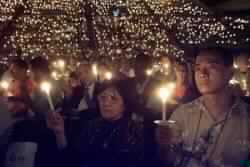Activists and officials united in calling for cheap, life-savings drugs to be made available to fight AIDS in poor countries as the world's biggest conference on the disease opened amid controversy on Sunday. A protest overshadowed the opening ceremony of the Barcelona international AIDS conference as AIDS activists kept up a chorus of jeers and whistles that drowned out the words of Spanish Health Minister Celia Villalobos. (Read photo caption)
Some among the 15,000-strong audience walked out.
Villalobos battled on to the end despite the deafening jeers which AIDS activists said were a protest against the Spanish government's refusal of visas to a number of people from developing countries who planned to attend the conference.
Activists allege the government wanted to keep out people from the developing world with the virus that causes AIDS -- a charge Madrid denies.
"If you are HIV positive and you can't provide proof you have medical insurance you were banned from coming," said David Miller, from the New York branch of AIDS activist group Act-Up.
The Spanish government says it granted more than 17,000 visas for the conference and refused fewer than 100 for failing to comply with immigration requirements. It said these included having a plane ticket and medical insurance but said it did not require proof that would-be participants were HIV negative.
EMOTIONAL MOMENT
The most emotional moment of the opening ceremony came when the lights dimmed and the audience held up thousands of candles in memory of those who have died of AIDS as cellist Damian Martinez played a wistful tune.
Peter Piot, head of the United Nations AIDS agency, UNAIDS, said the world must not allow the AIDS crisis in Africa -- where more than 30 percent of people in some countries carry HIV -- to be repeated in other continents.
"The world stood by while AIDS overwhelmed sub-Saharan Africa. Never again," Piot said.
UNAIDS warned last week the AIDS epidemic was still in its infancy and could kill 70 million people over the next 20 years as it spreads deeper into Asia and Eastern Europe. People with HIV, the virus that causes AIDS, can live for many years in the West thanks to expensive antiretroviral drugs. But despite some price cuts, these drugs are available only to small numbers of people in developing countries.
Piot dismissed the argument that it is not technically feasible to bring sophisticated antiretroviral treatment to millions of people in some of the world's poorest countries.
"It's not knowledge that's the barrier. It's political will," Piot said.
Outside the conference, some 500 activists took to the streets to echo Piot's call, demanding cuts in the price of AIDS drugs in rich countries and universal access to generic, cheaper versions of these drugs in poor countries.
In a declaration they called for 10 billion U.S. dollars a year to be donated to the global AIDS fund and for at least two million people with HIV in developing countries to receive antiretroviral treatment by 2004.
GULF BETWEEN RICH AND POOR
The gulf between the world's richest and poorest countries has never been more evident.
Fred Minandi, a 42-year-old farmer from Malawi, is one of the lucky 30,000 in poor countries receiving drugs and living proof that it is possible to deliver cheap drugs in countries without an infrastructure.
"There are some people who say that in Africa, people will not be able to take these drugs because they cannot tell the time," said Minandi. "I may not have a watch but I can assure you that since I started taking my triple therapy in August last year, I haven't missed one dose."
For10 billion U.S. dollars a year, AIDS experts are convinced they can launch a credible response to the epidemic with improved prevention against new infections and antiretroviral drugs for people already living with HIV/AIDS.
But so far less than a third of the amount is available.
"The response of donors to date is appalling. The 10 billion U.S. dollars a year needed to combat AIDS is equivalent to just four days global military spending or what rich countries spend on agricultural subsidies in 10 days," said Oxfam's Mogha Smith. (Additional reporting by Patricia Reaney, Adrian Croft)
PHOTO CAPTION
Activists holds candles during a night vigil in Palau Sant Jordi Barcelona July 7, 2002, at the world's biggest conference on AIDS. Activists and top officials have united in calling for cheap, life-saving drugs to be made available to combat AIDS in poor countries. (Gustau Nacarino/Reuters)
- Author:
Reuters - Section:
WORLD HEADLINES


 Home
Home Discover Islam
Discover Islam Quran Recitations
Quran Recitations Lectures
Lectures
 Fatwa
Fatwa Articles
Articles Fiqh
Fiqh E-Books
E-Books Boys & Girls
Boys & Girls  Ramadan
Ramadan Fatwa Audios
Fatwa Audios Month of Mercy
Month of Mercy Women
Women Eed Al- Fitr
Eed Al- Fitr Food Recipes
Food Recipes Videos
Videos

 Prayer Times
Prayer Times












